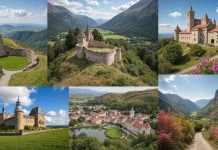Choosing the Right Backpack for European Exploration
Size and Fit
Finding the perfect backpack is crucial. A comfortable fit that suits your body size can make all the difference. When selecting a backpack, aim for one with a 40-60 liter capacity. This size is usually enough to accommodate all essentials without being too cumbersome. Ensure that the backpack sits on your hips, distributing the weight evenly across your body.
Adjustable Straps and Padding
Look for backpacks with adjustable shoulder, chest, and hip straps. Padding is also essential to avoid any discomfort during long hours of walking. Trial different designs to see which offers the best support and feels most comfortable on your body.
Durability and Weather Resistance
Europe's weather can be unpredictable, ranging from sunshine to unexpected showers. Therefore, prioritize durability and weather resistance when choosing a backpack. Opt for materials like ripstop nylon and backpacks that come with a waterproof rain cover to keep your belongings dry.
Access and Compartments
Efficiency is key when you’re on the road. Consider backpacks with multiple compartments for better organization. Access to the main compartment from both top and front can be incredibly handy. External pockets can store items you may need quick access to, like a water bottle or guidebook.
Budgeting for Your Backpacking Trip
Setting a Realistic Budget
Traveling on a budget doesn't mean you have to sacrifice experiences; it just means planning smarter. Determine your must-see destinations and activities, and allocate your funds accordingly. Be mindful of the costs that can quickly add up, like accommodation and dining.
Accommodation Costs
Consider staying in hostels, which offer budget-friendly options and are perfect for meeting fellow travelers. Booking in advance through apps or websites can also secure better rates. Look out for discounts for stays longer than a couple of nights.
Alternative Accommodation Options
If hostels aren't your thing, consider couchsurfing or renting an apartment through platforms like Airbnb. Both can provide unique insights into local culture and a more homely environment.
Transportation Expenses
Europe is interconnected with extensive railway systems, budget airlines, and buses. Consider investing in a train pass if you plan on traveling frequently. Apps and websites can help you find the best deals on cross-country bus services — a great alternative for those on a tight budget.
Saving on Flights
Book your flights during off-peak seasons to benefit from lower prices. Tools like price comparison websites and tracking alerts can notify you of the best deals. Flexibility with your travel dates and routes can also save you money.
Daily Expenses
Eating out can be expensive, but many European cities have vibrant markets and street food scenes offering delicious options at affordable prices. When dining out, go where the locals go for a more authentic and oftentimes cheaper experience.
Free and Affordable Attractions
Europe is rich with history and natural beauty, much of which can be enjoyed for free or a small fee. Museums often offer discounted rates or free entry on certain days, and exploring local parks and landmarks doesn’t cost a thing.
Planning Your Route: Countries and Cities Not to Miss
Western Europe
France
Paris is a must with its iconic Eiffel Tower and Louvre Museum, but don’t overlook the French Riviera or the quaint countryside villages like those in Provence. Each region offers a unique glimpse into French culture.
Spain
From the pulsating heart of Barcelona to the historic charm of Seville, Spain provides a diverse range of experiences. Don't miss the Alhambra in Granada and the vibrant nightlife in Madrid.
Central Europe
Germany
Berlin boasts world-class museums and a rich history, while Munich offers a glimpse into Bavarian culture. Explore the romantic Rhine Valley or the fairy-tale Neuschwanstein Castle.
Czech Republic
Prague is a magical city that feels like stepping back in time. Its old town Square, Charles Bridge, and Prague Castle are just the beginning of its attractions.
Northern Europe
Sweden
Stockholm captivates with its innovative architecture and rich maritime history. Don't miss the archipelago of islands around the city. For a bit of Viking history, visit the historical site of Birka.
Norway
The stunning fjords of Norway are a natural wonder. Take a scenic train ride from Oslo to Bergen for some of the mistiest, most beautiful landscapes you'll ever see.
Southern Europe
Greece
Greece is synonymous with ancient history and idyllic islands. Visit Athens for its historic temples and wander through the narrow streets of Santorini.
Italy
From the canals of Venice to the ruins of Rome, Italy’s cities each offer a distinct allure. Lose yourself in the art of Florence, or savor the flavors of Sicily.
Preparing for Diverse European Climates
When to Travel
Europe’s climates vary widely from region to region. The best time to travel depends on your destinations. The shoulder seasons of late spring and early autumn often provide pleasant weather with fewer crowds and lower prices.
Dealing with Northern Europe's Weather
Be prepared for cooler weather, even in the summer. Layers are your friend in countries like Sweden and Norway, where temperatures can dip unexpectedly, especially in the evenings.
Southern Europe's Warm Embrace
Countries like Italy, Spain, and Greece enjoy hot summers, so packing light clothing and sunscreen is a must. Expect these destinations to be crowded during peak summer months, so opt for early morning excursions to major attractions.
Handling Rain in Western Europe
The UK and Ireland can be rainy at any time of year, so a good rain jacket is essential. An umbrella can also come in handy, but don't let the wet weather put a damper on your plans — some of the best travel moments can be found exploring cozy coffee shops or local museums while it rains outside.
Packing Essentials for a Stress-Free Journey
Clothing and Shoes
Pack clothes that can be layered and easily mixed and matched. Choose items that support a variety of weather conditions and culturally sensitive scenarios. Comfortable walking shoes are a must, as you’ll be on your feet exploring most days.
Gadgets and Accessories
A travel adapter is essential for charging electronics across different countries. If you’re planning to use a dedicated camera, ensure you have extra batteries and ample memory storage. A good travel app on your smartphone will help with maps, translations, and booking accommodations.
Toiletries and First Aid
Miniature travel bottles for shampoo, conditioner, and lotions save space in your backpack. A basic first aid kit with band-aids, antiseptic wipes, and any personal medications can prepare you for minor mishaps and help avoid pharmacy hunts in unfamiliar cities.
Day Pack Necessities
Consider having a smaller daypack for excursions and city walks. Having easy access to a water bottle, snacks, and your camera means you’ll always be ready to capture and enjoy each moment of your travels.
Reducing Packing: What to Leave Behind
Heavy Books and Bulky Items
While it’s tempting to bring along a selection of books, they add unnecessary weight. Consider an e-reader or audiobooks as a light alternative. Similarly, leave home any non-essential bulky items.
Unnecessary Valuables
Expensive jewelry and extravagant tools or gadgets should stay at home. Secure, hidden money belts or pouches offer peace of mind when it comes to your passport or cash, reducing the chance of loss or theft.
Cultural Etiquette and Language Tips
Understanding Local Customs
Dining Standards
In many European countries, dining is a social activity to be savored and appreciated. Understand the local customs and etiquette surrounding meals, such as tipping practices and when it’s appropriate to request the bill.
Behaviors to Avoid
Different parts of Europe will have nuanced norms regarding politeness and appropriate behavior. Take the time to learn a little about these customs to avoid unintentionally offending someone. For example, in much of the Mediterranean, it’s considered rude to refuse an offer of food.
Language and Communication
Basic Phrases
Learning a few phrases in the local language can go a long way. Simple greetings or being able to ask for directions can earn you goodwill and give you a more immersive experience as you interact with locals.
Apps and Resources
Translation apps on your smartphone can assist when language barriers arise. Additionally, carrying a pocket phrasebook can be a fun way to challenge yourself and improve your skills.
Making the Most of Local Experiences
Participating in Local Festivals
Time your travels to coincide with local festivals and events. Whether you’re interested in music, art, or traditional celebrations, participating can provide a more in-depth understanding of the country’s culture and traditions.
Engaging in Workshops and Tours
Consider enrolling in a cooking class in Italy or a pottery-making session in Portugal. These hands-on experiences add an extra dimension to your travels and leave you with new-found skills to brag about.
Supporting Local Businesses
When purchasing souvenirs, look for locally made products, rather than imported trinkets. Support small businesses by choosing local markets or family-run shops. Your contribution assists local economies and gets you unique keepsakes with genuine stories.
Staying Safe and Healthy on Your Journey
Health Precautions
Vaccinations and Insurance
Check in advance whether you need any vaccinations for your trip. Travel insurance is a non-negotiable investment. It can cover unexpected situations like medical emergencies and theft.
Eating Safely
While street food can be enticing, inspect food stall hygiene or choose cooked items. Drink bottled water if you’re unsure of the water quality, especially in less developed areas.
Packing Security Devices
Secure your belongings with padlocks, especially if you’ll be staying in hostels where shared accommodation is common. Additionally, a money belt can be an effective way to discreetly carry passports and cash.
Avoiding Scams and Thefts
Stay vigilant in crowded areas and be wary of overly eager “helpers.” Trust your instincts; if something feels off, it’s good to back away. Guidebooks and travel forums can familiarize you with common scams.
Accessing Healthcare Overseas
Familiarize yourself with healthcare access in your travel countries. The European Health Insurance Card (EHIC) provides coverage for EU/EEA countries, or check your travel insurance for partnerships with local medical providers.
In conclusion, these insights into backpacking across Europe can equip you for an enriching experience while allowing room for spontaneous adventures. Each destination offers unique sights and cultures to savor, so gear up, chart your path, and relish the journey of a lifetime. Enjoy every moment, and most importantly, safe travels!































